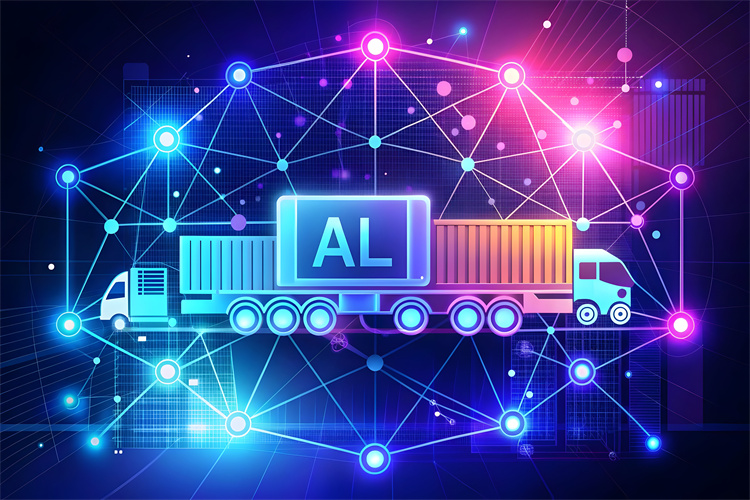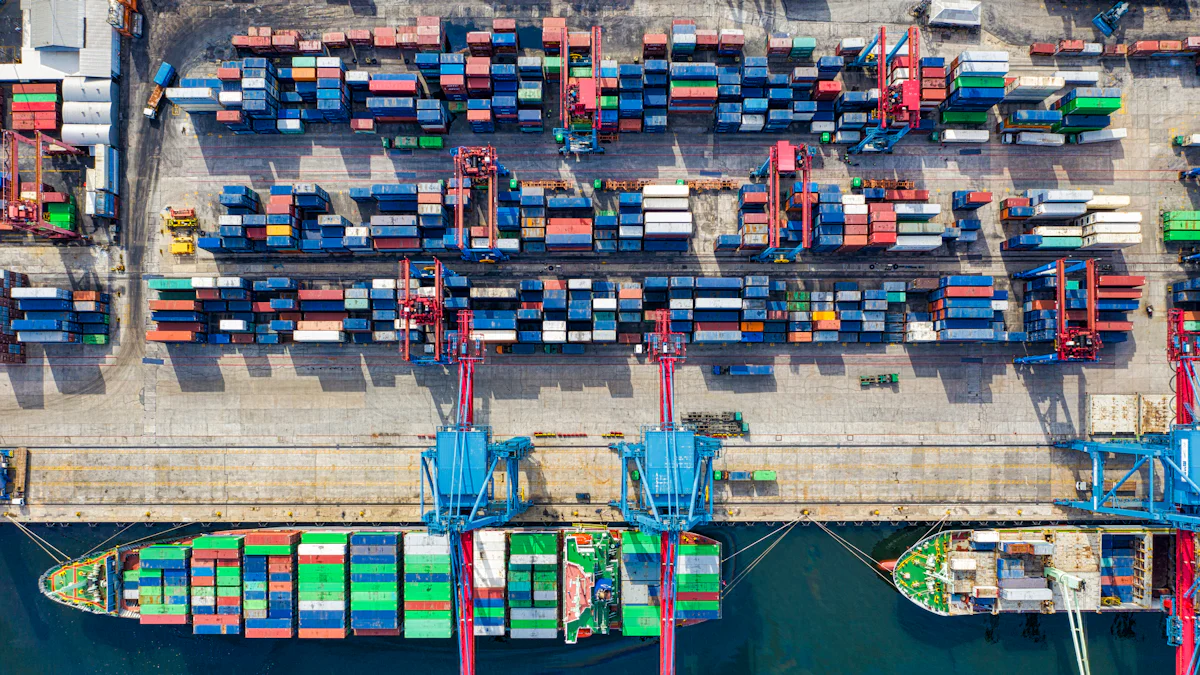Advanced Applications of Generative AI in Supply Chain Logistics

Generative AI revolutionizes supply chain logistics. This technology enhances efficiency and reduces disruptions. Many organizations have adopted Generative AI, with a 65% adoption rate. Companies experience meaningful revenue increases in supply chain management. Generative AI optimizes routes, forecasts demand, and manages inventory. These capabilities transform logistics operations. Supply chains benefit from improved accuracy and foresight. Generative AI's potential remains vast, promising continued advancements. Businesses investing in this technology gain competitive advantages. The future of supply chain logistics looks promising with Generative AI.
Current Challenges in Supply Chain Logistics
Demand Variability
Demand variability presents a significant challenge in supply chain logistics. Businesses struggle to predict consumer demand accurately. This unpredictability leads to several issues.
Impact on Inventory Levels
Fluctuating demand affects inventory levels. Overstocking or understocking becomes a common problem. Excess inventory ties up capital and increases storage costs. Insufficient stock results in missed sales opportunities. Companies face pressure to balance inventory effectively.
Challenges in Forecasting
Forecasting demand accurately remains difficult. Traditional methods often fail to capture sudden changes. External factors like economic shifts and consumer trends influence demand. Businesses require advanced tools for precise demand forecasting. Generative AI offers solutions through predictive analytics. Companies can leverage historical and real-time data for better accuracy.
Route Optimization
Route optimization is another critical issue in supply chain logistics. Efficient route planning reduces costs and improves delivery times. However, several factors complicate this process.
Traffic and Weather Considerations
Traffic congestion and weather conditions impact delivery schedules. Delays lead to increased fuel consumption and operational costs. Businesses need dynamic routing algorithms to adapt to changing conditions. Generative AI provides real-time updates for optimal route planning. Companies benefit from reduced travel time and improved efficiency.
Cost Implications
Inefficient routes result in higher transportation costs. Fuel expenses and vehicle maintenance add to the financial burden. Businesses aim to minimize these costs for better profitability. Generative AI identifies cost-effective routes by analyzing vast transportation data. Companies achieve significant savings and enhance their competitive edge.
Generative AI addresses these challenges with innovative solutions. Companies adopting this technology gain a strategic advantage. The future of supply chain logistics depends on embracing these advancements.
Applications of Generative AI

Demand Forecasting
Generative AI transforms demand forecasting in supply chain logistics. Companies use predictive analytics to anticipate consumer needs. This technology analyzes historical and real-time data for precise predictions. Businesses gain insights into demand patterns and trends.
Predictive Analytics
Predictive analytics powered by Generative AI offers unparalleled accuracy. Companies rely on advanced algorithms to process vast datasets. This approach identifies emerging trends and potential demand spikes. Businesses adjust strategies proactively to meet consumer expectations. Generative AI reduces the risk of overstocking or understocking.
Real-world Examples
Several companies showcase the power of Generative AI in demand forecasting. A leading retailer improved sales forecasts by 20% using this technology. Another firm reduced inventory costs by 15% through accurate demand predictions. These examples highlight the tangible benefits of adopting Generative AI.
Inventory Optimization
Generative AI optimizes inventory management in supply chains. Businesses maintain optimal stock levels with this technology. Companies minimize waste and maximize efficiency.
Stock Level Management
Stock level management becomes more efficient with Generative AI. Businesses monitor inventory in real-time to prevent shortages. This technology ensures products remain available when needed. Companies reduce storage costs and improve cash flow.
Route Planning
Generative AI revolutionizes route planning in logistics. Companies achieve significant cost savings and efficiency gains. This technology enables dynamic routing for optimal delivery paths.
Dynamic Routing Algorithms
Dynamic routing algorithms powered by Generative AI adapt to changing conditions. Businesses receive real-time updates on traffic and weather. This information allows for quick adjustments to delivery routes. Companies experience reduced travel times and fuel consumption.
Benefits and Examples
The benefits of Generative AI in route planning are substantial. A logistics provider decreased delivery times by 40% with AI-driven routing. Another firm saved 20% on transportation costs through optimized routes. These examples illustrate the competitive advantages of leveraging Generative AI.
Impact on Supply Chain Efficiency and Customer Satisfaction

Efficiency Improvements
Reduced Lead Times
Generative AI significantly reduces lead times in supply chain logistics. Companies achieve faster processing and delivery of goods. This technology enables real-time data analysis for quick decision-making. Businesses experience fewer delays in production and shipping. Generative AI ensures a seamless flow of operations, enhancing overall efficiency.
Cost Savings
Cost savings become evident with the integration of Generative AI. Companies optimize resource allocation and reduce waste. Advanced algorithms identify cost-effective strategies for inventory and transportation. Businesses benefit from lower operational expenses. Generative AI provides a competitive edge through substantial financial savings.
Enhancing Customer Experience
Faster Delivery Times
Faster delivery times enhance customer satisfaction in supply chain logistics. Generative AI facilitates efficient route planning and demand forecasting. Companies meet customer expectations with timely deliveries. This technology minimizes disruptions and ensures prompt service. Businesses gain customer loyalty through reliable and speedy delivery.
Improved Service Levels
Improved service levels result from the application of Generative AI. Companies offer personalized and responsive customer interactions. Advanced analytics provide insights into consumer preferences and behaviors. Businesses tailor services to meet individual needs and expectations. Generative AI fosters stronger customer relationships and drives brand loyalty.
Future Trends and Challenges
Emerging Technologies
Integration with IoT
The integration of Generative AI with the Internet of Things (IoT) transforms supply chain logistics. IoT devices collect real-time data from various sources. Generative AI analyzes this data to enhance decision-making processes. Companies achieve unprecedented levels of efficiency and accuracy. The combination of these technologies optimizes inventory management and route planning. Businesses gain a competitive edge by leveraging IoT and AI together.
AI-driven Automation
AI-driven automation revolutionizes operational processes in supply chain logistics. Companies automate repetitive tasks, reducing human error and increasing productivity. Generative AI enables machines to learn from data and improve over time. Businesses benefit from cost savings and faster operations. AI-driven automation supports scalability and flexibility in logistics. Organizations that adopt this technology position themselves for future success.
Implementation Challenges
Data Privacy Concerns
Data privacy concerns pose significant challenges in the adoption of Generative AI. Companies collect vast amounts of sensitive information for analysis. Protecting this data becomes crucial to maintain trust and compliance. Organizations must implement robust security measures to safeguard data. Failure to address privacy concerns may lead to legal and reputational risks. Businesses need to prioritize data protection to ensure successful AI implementation.
Workforce Adaptation
Workforce adaptation presents another challenge in integrating Generative AI. Employees require training to work alongside AI technologies effectively. Companies must invest in skill development and education programs. A well-prepared workforce can harness the full potential of AI. Resistance to change may hinder the adoption process. Organizations need to foster a culture of innovation and adaptability. Embracing AI requires a collaborative effort between humans and machines.
Generative AI transforms supply chain logistics by addressing challenges and optimizing operations. Companies experience significant improvements in demand forecasting, inventory management, and route planning. The technology enhances efficiency and customer satisfaction, offering a competitive edge. Supply chain analytics reveal key lessons for organizations to tailor capabilities based on business needs. Generative AI remains in early stages of adoption, with limited organizations reporting substantial EBIT impact. The future holds immense potential for further advancements. Businesses investing in Generative AI will secure long-term success and innovation in supply chain logistics.
See Also
AI Supply Chain: Innovating Efficiency for Tomorrow
Insights into AI Integration: Future-Proofing the Supply Chain
Revolutionizing Logistics: AI's Impact on Future Supply Chain
Machine Learning Reshaping Supply Chain: Big Data Perspectives
